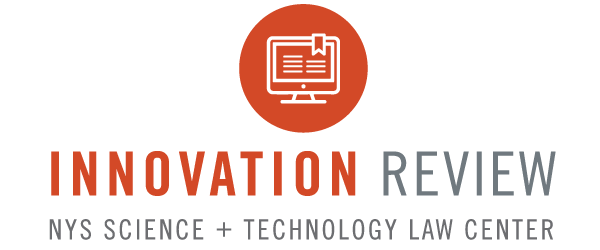| |
 |
| | | Monthly information on a variety of economic, business, and technology related legal news as well as highlights and profiles of resources and events across New York state. |
| |
| |
|
| |
|
| | | | Sen. Hatch Meets with Task Force to Discuss Patent Reform In the continuing debate about the effect of non-practicing-entities (or patent trolls) and other patent issues, Sen. Orrin Hatch (R-UT) convened the Senate Republican High-Tech Task Force on October 3. Panelists included IT companies Intel, Google, Adobe, Oracle and Salesforce. Topics, outlined in an article written by Sen. Hatch, included the TC Heartland decision and its impact on where patent plaintiffs can initiate litigation. Other topics included inter partes review processes, and measures to insure valid patents survive review. The meeting also touched on what limits Congress should place on patents, given the rise of “considerable uncertainty for technology and life sciences companies” due to recent Supreme Court decisions. | | | | Federal Circuit Dives Into Burden of Persuasion Question in Aqua Products v Matal Who has the burden to show that amended claims are patentable? The patent owner or the petitioner initiating the inter partes review (IPR)? That was the question the Federal Circuit decided in its Aqua Products v Matal decision earlier this month. In a much-anticipated October 4 ruling, the Federal Circuit overturned the USPTO’s regulation placing the burden on the patent owner. Nine of the eleven judges supported the final ruling to overturn the USPTO interpretation of 316(e). What divided the court was how much deference should be given to the USPTO, a question that rested on whether 316(e) contains ambiguous language. Nine of the eleven Federal Circuit judges on the panel ruled that the statute was clear on its face, and therefore the petitioner has the burden of persuasion and the USPTO had no basis to shift that burden to the patent owner. For more on the decision, click here. | | | | Tips for Protecting Your IP in the Internet-Of-Things In the debate on whether or not to seek patent protection for information technology, the ever-changing and rapidly growing Internet-of-things (IoT), provides an interesting challenge. From smart cars, to at-home devices, smart phones, and smart grids, the IoT ecosystem is a complex mix of industries, and even the smallest IoT system can have a plethora of active patents. Although some argue that patenting in the rapidly changing world of IT isn’t necessary, how would you go about protecting your IP in the IoT? Rob Bloom, senior associate at Morningside IP, suggests that you start by patenting your innovations as quickly as possible, including having a broad patent application. From there, you should work on having a strong patent portfolio that can provide income, partnerships, and act as a litigation deterrent. You should also consider having strong design patents that will deter knock-offs. For more details how to protect your IP in the IoT, click here. |
| |
| |
|
| |
|
| | | | Institute for Advanced Manufacturing Clinton Community College Officially Opens Governor Andrew Cuomo officially announced the opening of The Institute for Advanced Manufacturing at Clinton Community College earlier this month. The institute will support advanced manufacturing throughout the North Country and provide hands-on technical training. Clinton Community College began construction on the new 30,000 square foot facility in May of this year, after securing $12.7 million in funds as part of the SUNY 2020 challenge grant program. “The Institute for Advanced Manufacturing will attract the brightest in the business to come and train at the new state-of-the-art facility, helping to build the North Country’s economic momentum,” said Gov. Cuomo. For more on the new institute, click here. |
| |
| |
|
| |
|
| | | | Reminder – NEXT Syracuse Event The fourth edition of the NEXT Conference and Tech Showcase will take place on Friday, November 17 at Sheraton Syracuse University. The conference will bring together investors, entrepreneurs, researchers, attorneys, and tech transfer reps to focus on innovation in technology, manufacturing, and biotech. The full-day program will feature three tracks, including a legal issues in technology commercialization track put together by the NYS STLC. 3 panels will present information on: Protecting IP, Agreements in Tech Commercialization, and Venture Assistance for Innovation and Capitalization. The event will also feature two key-note speakers, artificial intelligence and robotics expert Hod Lipson, PhD, as well as neuroscientist and medical intelligence expert Dave Warner, MD PhD. To learn more about the event and to register, click here. | | | | Commercialization Competition The first-ever FuzeHub Commercialization Competition will take place in Albany, NY on November 15 and 16. The two-day event will feature a pitch competition and a plethora of networking opportunities for entrepreneurs and the broader technology community. Up to five companies will win $50,000 each for their project. To register for the Commercialization Competition and to learn more, click here. |
| |
| |
|
| |
|
| | | | Shubha Ghosh Publishes IP Research Handbook Shubha Ghosh, Crandall Melvin Professor of Law and Director of the Technology Commercialization Law Center, has published a two-volume research handbook titled “Intellectual Property and Innovation.” The handbook includes 39 articles, dating from 1990 to 2015, on the theory and practice of IP law. For more on the handbook, click here. |
| |
| |
|
| |



